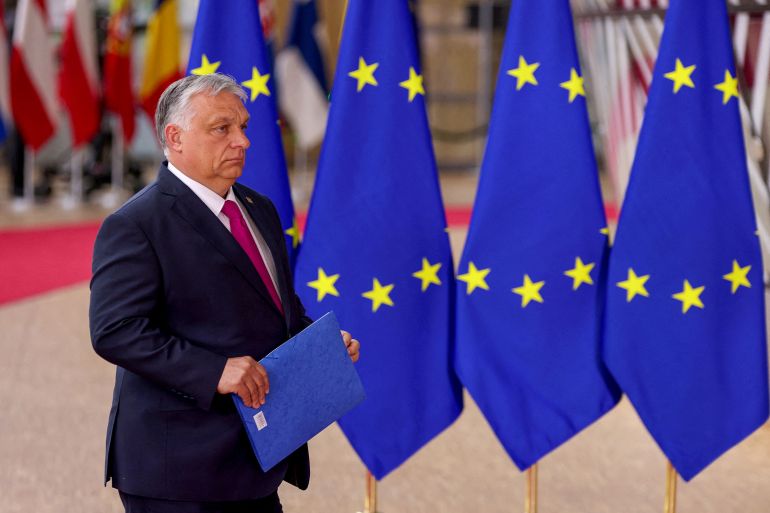Ukraine urges EU not to fall for ‘trap’ of giving ground to Putin
The EU says sanctions against Russia for invading Ukraine are working, despite the threat to its own energy supplies.

Ukraine’s foreign minister Dmytro Kuleba has warned his European Union counterparts against any temptation to loosen their sanctions on Russia or give in to the demands of President Vladimir Putin.
“Backing down and bowing to his demands will not work, it has never worked. This is a trap,” Kuleba told a meeting of the EU’s 27 foreign ministers on Monday, according to remarks shared with reporters.
Keep reading
list of 3 itemsHungary stalls new EU sanctions on Russia: Diplomats
Why is Hungary not backing EU sanctions on Russian oil?
“I am sure that in the following weeks there will be more Kremlin-leaning voices nudging the public opinion into giving Putin what he wants so that he leaves Europe alone. We should actively counter these narratives,” he added.
Kuleba’s comments came as the European foreign ministers said sanctions imposed on Russia to punish it for invading Ukraine are working – despite the threat to the EU’s own energy supplies.
Last week, one EU leader, Hungary’s nationalist premier Viktor Orban, denounced the bloc’s sanctions policy and claimed that Brussels was doing more harm to Europe’s own economy than it was to Moscow.
Arriving at EU headquarters for talks on how to close loopholes in the sanctions regime and increase pressure on Russia, EU foreign policy chief Josep Borrell rejected Orban’s claim.
“Some European leaders have been saying that the sanctions were an error, were a mistake,” he told reporters. “Well, I do not think it was a mistake. It is what we had to do and we will continue doing.”

EU officials say the sanctions being drawn up will see some 90 percent of Russian oil exports to the EU halted by the end of the year as the bloc tries to halt funds flowing to Moscow’s coffers.
Luxembourg’s foreign minister Jean Asselborn dismissed the idea of dropping the sanctions: “That would be fatal if we did that. It is our credibility that is at stake.
“Normally we would have to use diplomacy, the UN, to try to get this right. But we are not in a normal time. We are in a time where the laws of the jungle count.”
Since February, when Russia invaded its neighbour Ukraine, which it already partially occupies, the EU has deployed an escalating series of six sanctions packages against Moscow.
Most oil imports have been banned since June, and diplomats are discussing a gold embargo, but many European countries remain dependent on Russian gas for their energy supplies.
Borrell and most Western leaders insist that the sanctions have damaged Russia’s economy and will only get tighter if Putin fails to withdraw his forces from Ukraine.
But on Friday, Orban – the closest EU leader to the Kremlin and a frequent critic of Brussels – slammed the measures, arguing that Europe had “shot itself in the lungs” by hurting energy supplies.
“Brussels thought that the sanctions policy would hurt the Russians, but it hurts us more,” he said.
Borrell and the EU ministers held talks over video link with Kuleba, before discussing among themselves how to tighten existing sanctions.
Borrell noted that EU officials are drawing up plans to ban imports of Russian gold, but added: “We do not say ‘new package’, but improving the implementation of the already existing sanctions.”
In the meantime, Russia has begun to disrupt gas supplies to Europe, threatening the energy security of countries like EU industrial powerhouse Germany.
“Russia is trying to demoralise us,” Germany’s Minister of State for European Affairs Anna Luehrmann said.
“We will continue to support Ukraine, both economically, politically, but also with military means,” she said. “It is very important that the sanctions are maintained.”
Later on Monday, EU foreign ministers agreed another 500 million euros ($504m) of EU funding to supply arms to Ukraine, taking the bloc’s security support to 2.5 billion euros since Russia invaded Ukraine.
“Today at the EU foreign ministers meeting, a political agreement was reached on the fifth tranche of military assistance to Ukraine,” Sweden’s Foreign Minister Ann Linde said in a statement.
The money should help the EU continue to jointly buy equipment and supplies for the Ukrainian military, including lethal weaponry, which the bloc has said should be used for defensive purposes.